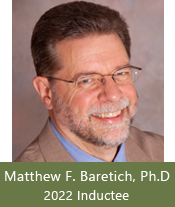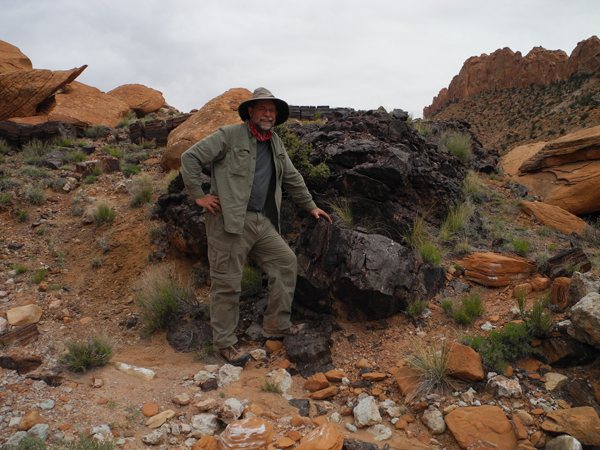
Matt has been inducted into the Clinical Engineering Hall of Fame in recognition of his significant contributions to the advancement of the profession in several key areas: He has been one of the most influential pioneers and industry leaders in clinical engineering for the past four decades. By way of the writings and the presentations he has given throughout his career, Matt's thoughtful and innovative approach has helped shaped today's clinical engineering industry concepts. These concepts include such areas as scaling HTM services to an organization's needs, patient safety, incident investigation, benchmarking, maintenance management, and risk management. Matt is the author of numerous authoritative guides on topics ranging from electrical safety, to CE benchmarking, to computerized maintenance management systems, to forensic engineering, and alternative maintenance management processes among others. He has served on the editorial review board of clinical engineering, forensic engineering and healthcare engineering publications where he has helped curate and ensure the best and most relevant content gets to a readership in need of the latest word in their profession.
Matt's reputation and influence have extended well beyond his employment in the U.S. and Canada. He has written and edited clinical engineering material for the World Health Organization (WHO) and has taught at more than a half dozen international ACCE advanced clinical engineering workshops (ACEW). Matt has also helped the clinical engineering community by reaching out and actively working with organizations representing other professionals (e.g., healthcare engineers, risk managers) thereby demonstrating clinical engineering's value to the broader healthcare community. For more than four decades, Matt has been a valued colleague within the clinical engineering community.
Education:
- Ph.D., Hospital and Health Administration. The University of Iowa, 1986
- M.S., Biomedical Engineering. Iowa State University, 1977
- B.S., Electrical Engineering. Iowa State University, 1975
Certification, Registration and Peer Recognition:
- Certified Professional in Patient Safety (CPPS). Certification Board for Professionals in Patient Safety, 2015
- Certified Professional in Healthcare Risk Management (CPHRM). AHA Certification Center, 2009
- Certified Clinical Engineer (CCE). Healthcare Technology Certification Commission, ACCE Healthcare Technology Foundation, 2004
- Certified Healthcare Facility Manager (CHFM). AHA Certification Center, 2000
- Professional Engineer (PE), Colorado. State Board of Registration for Professional Engineers and Professional Land Surveyors, 1987
- Professional Engineer (P.Eng.), Engineers and Geoscientists British Columbia, 2021
- Certified Clinical Engineer (CCE). AAMI Certification Commission, 1980
- ACCE Lifetime Achievement Award. American College of Clinical Engineering, 2019
- AAMI Fellow (AAMIF). Association for the Advancement of Medical Instrumentation, 2017
- AAMI HTM Leadership Award. Association for the Advancement of Medical Instrumentation, 2017
- Associate Member of the National Academy of Forensic Engineers. National Academy of Forensic Engineers, 2015
- Fellow of the American Institute of Medical and Biological Engineering (FAIMBE). American Institute of Medical and Biological Engineering, 2012
- ACCE/HTF Marvin D. Shepherd Patient Safety Award, 2008
- Fellow of the American Society for Healthcare Engineering (FASHE). American Society for Healthcare Engineering, 2007
- ACCE Professional Development Award. American College of Clinical Engineering, 2006
- ASHE Regional Leader Award. American Society for Healthcare Engineering, 2006
- Fellow of the American College of Clinical Engineering (FACCE). American College of Clinical Engineering, 2003
Summary of Career:
Matt Baretich has been one of the most influential pioneers and industry leaders in clinical engineering for the past four decades. By way of the writings and the presentations he has given throughout his career, Matt's thoughtful and innovative approach has helped shaped today's clinical engineering industry concepts. These concepts include such areas as scaling HTM services to an organization's needs, patient safety, incident investigation, benchmarking, maintenance management, and risk management.
Matt is the author of numerous authoritative guides on topics ranging from electrical safety, to CE benchmarking, to computerized maintenance management systems, to forensic engineering, and alternative maintenance management processes among others.
Matt co-led a group of CMMS vendors to establish standardized failure codes so that Clinical Engineers throughout the US can collect and compare PM and failure data. This project has the potential to significantly improve Alternative Equipment Maintenance (AEM) programs and other data-driven clinical engineering endeavors. High-quality AEM programs require high-quality data, and standardizing key CMMS fields such as failure code will yield much higher quality CMMS data. AEM and similar programs can save HTM programs hundreds of thousands of dollars in cost each year with no decrease in patient safety, nor other downsides, as long as there is good data to support the initiation and continuation of such programs.
He has served on the editorial review board of clinical engineering, forensic engineering and healthcare engineering publications where he has helped curate and ensure the best and most relevant content gets to a readership in need of the latest word in their profession.
Matt has a keen sense for applying his project-specific experience towards improvement of the overall clinical engineering profession. For example, as the scope of work for his consulting engagement with the Kaiser Permanente Clinical Technology program was defined, Matt foresaw the applicability of the lessons learned and general outcomes to the broader clinical engineering community. At his encouragement and with his support, the project team produced three distinct conference presentations and two distinct articles for publication. At the core of this project was the goal of describing and optimizing the points of intersect between the Clinical Technology (i.e., clinical engineering) program and a myriad of clinical and administrative departments. Ultimately, the work produced greater collaboration within the KP community and opened dialog in the broader clinical engineering community around topics well beyond routine maintenance – e.g., organizational risk assessment and management.
Matt has been an invaluable partner in leading a charge for greater data integrity. Together with CMMS suppliers, progress is being made to standardize the data fields and codes routinely collected by clinical engineering departments around the world. As a result, our collective ability to understand and manage the technical, financial, and clinical impacts of medical devices and systems increases exponentially.
Matt's reputation and influence have extended well beyond his employment in the U.S. and Canada. He has written and edited clinical engineering material for the World Health Organization (WHO) and has taught at more than a half dozen international ACCE advanced clinical engineering workshops (ACEW). Matt has also helped the clinical engineering community by reaching out and actively working with organizations representing other professionals (e.g., healthcare engineers, risk managers) thereby demonstrating clinical engineering's' value to the broader healthcare community. For four decades, Matt has been a caring and valuable colleague to a great many in the CE and HTM community.
Below are some extracts from the material provided for his nomination:
"Before speaking to his prolific professional contributions, it's worth noting that in the very early days of his career, Matt understood the value and implications of clinical engineering on the broader healthcare industry. This is clearly illustrated by his pursuit and achievement of a doctoral degree in Hospital & Healthcare Administration with a dissertation addressing the effectiveness of technology management. I suspect that Matt called upon all of his influencing and negotiating skills to convince a predominantly business-oriented faculty to accept his dissertation topic."
"Granted, it is not a requirement for our Hall of Fame nor is it an influence that can be quantified, but it's also Matt's deep ethical and moral commitment, and perhaps obligation to clinical engineering that has and continues to make him one of the most influential thought leaders and true pioneers in our field."
"Matt has generously shared his technology and management experience and expertise for decades. His work on benchmarking projects and technology management guidebooks have literally changed "the norm" for practicing healthcare technology management. Much of this work serves as a cornerstone for existing and future AAMI equipment management (EQ) standards."
"Matt Baretich exemplifies the professionalism and qualities of character important to inductees of the ACCE Clinical Engineering Hall of Fame."
"What's amazing about Matt is his dedication to clinical engineering and the ever thoughtful and intelligent science- and engineering-based approach that he takes to the projects he works on."
"Matt is a leader in the clinical engineering/HTM and forensic engineering fields. He not only takes on difficult projects, but often publishes results advancing the profession so that others in clinical engineering can learn from his experiences."
|

Backpacking in Utah: Wolverine Petrified Forest near Little Death Hollow |